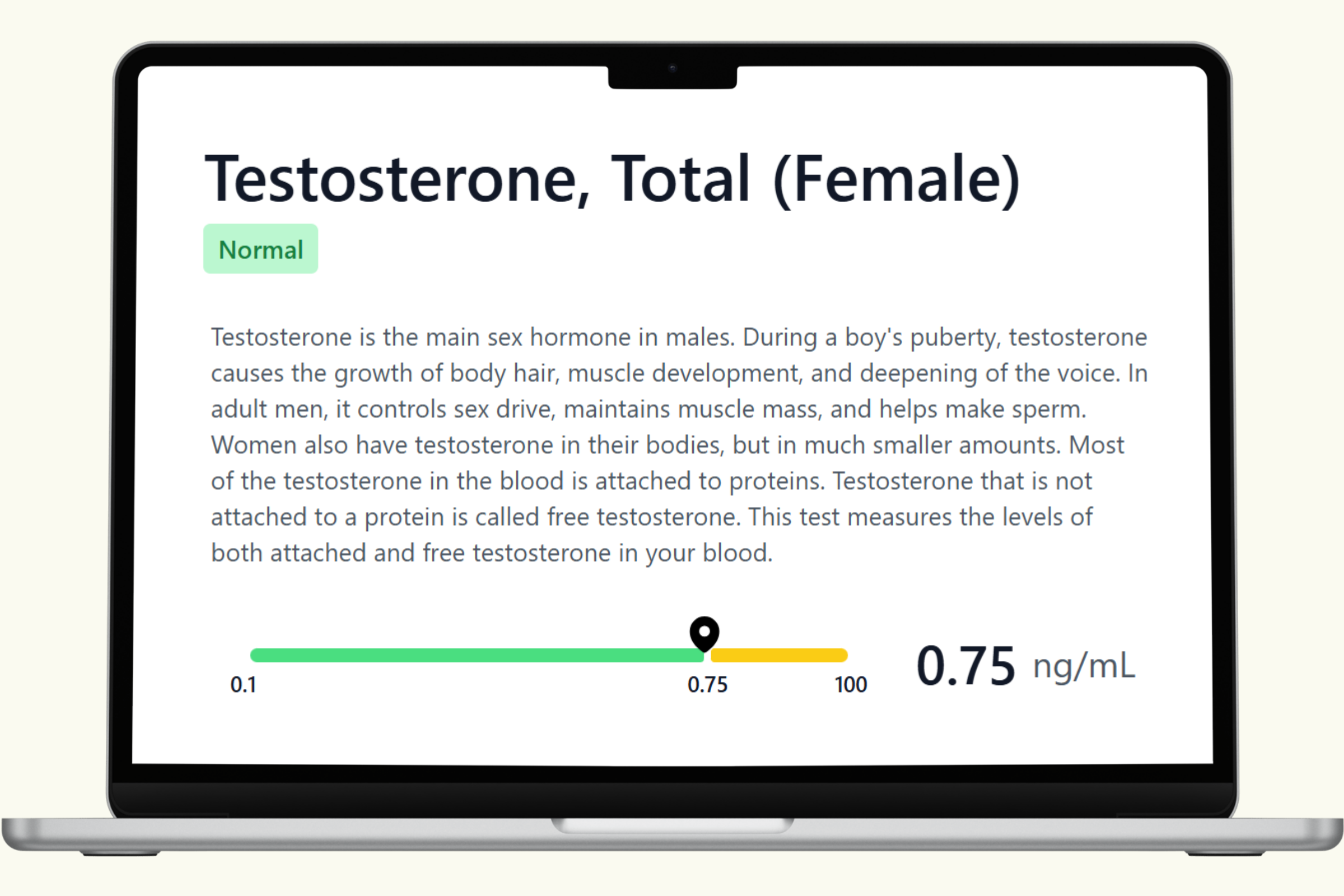Testosterone Blood Test: Measuring an Essential Hormone for Health
The Testosterone Blood Test, part of the PlexusDx Women’s Hormone Blood Test, measures total testosterone, including both free and protein-bound forms. While often thought of as a “male hormone,” testosterone plays a vital role in the health of both men and women. Produced primarily in the testes for men and in the ovaries for women, smaller amounts are also secreted by the adrenal glands. Testing testosterone levels can provide important insights into energy, mood, fertility, and long-term health.
What is Testosterone?
Testosterone is an androgen hormone that influences reproductive, musculoskeletal, and cognitive health. In the bloodstream, most testosterone is bound to proteins such as sex hormone-binding globulin (SHBG) and albumin. Only about 2–3% circulates freely, yet this “free testosterone” is the biologically active form that directly affects tissues. Because free testosterone is difficult to measure directly, most clinical labs assess total testosterone, which includes free and bound fractions.
Functions of Testosterone
Testosterone is essential for many aspects of health:
- Bone Density: Supports bone growth and helps prevent osteoporosis.
- Muscle Growth and Strength: Stimulates muscle protein synthesis and lean body mass maintenance.
- Red Blood Cell Production: Promotes healthy oxygen delivery by stimulating red blood cell formation in the bone marrow.
- Sexual Health: Regulates libido, arousal, and reproductive function in both men and women.
- Mood and Brain Function: Influences neurotransmitters that affect energy, focus, confidence, and emotional well-being.
Why Test Testosterone?
Doctors may recommend a testosterone test for several reasons:
- Fatigue and Low Energy: Declining testosterone can cause reduced stamina and motivation.
- Reduced Libido or Sexual Dysfunction: Both men and women may experience decreased sex drive or performance issues with low levels.
- Infertility Evaluation: Testosterone is essential for sperm production in men and contributes to egg quality and ovarian function in women.
- Menstrual or Hormonal Imbalances: Abnormal levels may be linked to irregular periods, polycystic ovary syndrome (PCOS), or early menopause.
- Bone and Muscle Health: Unexplained bone loss or muscle weakness may be related to insufficient testosterone.
- Mood Disorders: Low testosterone can contribute to depression, irritability, or brain fog.
Testosterone Reference Ranges
Testosterone levels vary depending on sex, age, and lab methodology. Below are commonly used reference ranges for total testosterone (ng/dL):
- Women: 15 – 70 ng/dL
- Men: 300 – 1,000 ng/dL
Levels naturally peak in early adulthood and decline gradually after age 30, typically by about 1% per year in men. Women may see testosterone fluctuations across the menstrual cycle and sharp decreases during perimenopause and menopause.
Functional Ranges for Optimal Health
Functional medicine practitioners may define narrower ranges for optimal well-being rather than just disease detection:
- Women (Optimal): 25 – 60 ng/dL
- Men (Optimal): 500 – 800 ng/dL
Values outside these ranges may indicate hormone imbalance, requiring further evaluation.
Symptoms of Low or High Testosterone
- Low Testosterone: Fatigue, low sex drive, erectile dysfunction, depression, decreased muscle mass, weight gain, brain fog, and osteoporosis risk.
- High Testosterone: In women, high levels may cause acne, irregular periods, excess hair growth, or PCOS. In men, unusually high levels may result from steroid use or tumors.
How the PlexusDx Testosterone Blood Test Works
The PlexusDx Women’s Hormone Blood Test uses a simple at-home dried blood spot collection method with an ADX card for convenient and reliable testing:
- Perform a quick finger prick to collect a few drops of blood.
- Apply the sample to the ADX collection card.
- Mail it back in the provided pre-paid envelope.
Certified laboratories process your sample, and you receive fast, accurate results—all from the comfort of your home.
How to Interpret Results
Your testosterone results should be reviewed in the context of your age, sex, menstrual status (for women), and overall health. For example, low testosterone in younger men may suggest testicular dysfunction or pituitary disorders, while in women it may point toward ovarian insufficiency or adrenal imbalance. Elevated testosterone may suggest PCOS in women or require further evaluation in men for overproduction causes.
Supporting Healthy Testosterone Levels
- Nutrition: Adequate protein, zinc, vitamin D, and healthy fats support hormone production.
- Exercise: Strength training and regular physical activity help maintain testosterone levels.
- Stress Management: Chronic stress elevates cortisol, which can suppress testosterone production.
- Sleep: Quality sleep is essential for optimal hormone release and balance.
- Medical Support: If levels are significantly low or high, your healthcare provider may recommend targeted treatments, including hormone therapy.
Key Takeaways
- The Testosterone Blood Test measures total testosterone, including free and protein-bound forms.
- Testosterone is vital for bone, muscle, mood, sexual health, and red blood cell production.
- Levels peak in early adulthood and decline naturally with age, affecting strength, energy, and libido.
- Both low and high levels can cause health issues, from infertility to PCOS or metabolic concerns.
- The PlexusDx Women’s Hormone Blood Test uses at-home dried blood spot collection for fast, accurate hormone insights.
By testing testosterone with PlexusDx, you gain a clearer picture of your hormone balance, empowering you to take proactive steps toward better energy, vitality, and long-term health.

Share:
Follicle-Stimulating Hormone (FSH) Blood Test